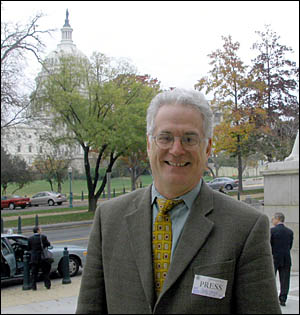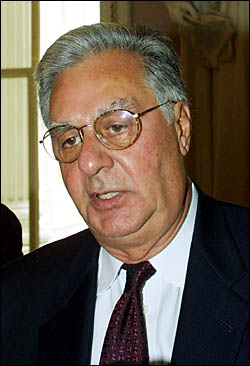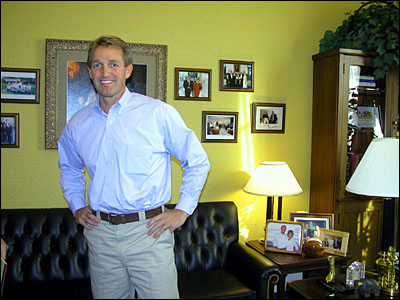 |
 | ||
 |
||
|
Part 1, 2  American RadioWorks Economics Editor Chris Farrell. Mark Twain once quipped that "there is no distinctly native American criminal class except Congress." That's too cynical, but it's true that Congress has been repeatedly rocked by major scandals and abuse of power throughout its history. For instance, during the Gilded Age of the 19th century, there was the Credit Mobilier scandal, when Congressmen got sweetheart railroad stock deals in return for votes and subsidies. And during the oil crisis of the late 1970s, there was "Abscam." FBI agents posed as Middle Eastern businessmen and bribed several Congressmen and government officials. Political scandals like these bring about their own cycle of punishment, scrutiny and reform. A striking example was in 1994. Republicans, led by then-Congressman Newt Gingrich, ended four decades of Democratic hegemony on a promise to clean up Washington. Yet 12 years later, evidence of widespread Republican corruption helped end the Republican era and bring the Democrats back to power. I wondered how much Capitol Hill will really change this time around. How much can it change? A thesis that had intrigued me for a long time was whether the life of perks and privilege members of Congress enjoy makes lasting reform difficult. So I set out to see some of those perks for myself.  A car bearing a congressional parking pass in the free lot for VIPs at Reagan National Airport. I began to tick them off as soon as I landed at Reagan National Airport. I checked out the free parking places members of Congress get right by the terminals. To be fair, members of Congress do come and go a lot to get home to their districts, so maybe they need this convenience. Still, it's a symbol of the red-carpet treatment members of Congress enjoy in Washington. Could an accumulation of privileges like this insulate lawmakers from the people they serve? People like you and me? If so, does a perk-driven lifestyle make it easier over time for members of Congress to succumb to the power of comfort and money? The first time I came to D.C. was during President John F. Kennedy's inauguration. My family of six piled into a big white station wagon, and we drove down from Toledo, Ohio. We stood in the snow and watched Kennedy's motorcade go by, and later that week, we took a tour of the Capitol. On my cab ride into town, I glimpsed the Capitol Dome and, corny as it sounds, every time I see it, I still feel like Jimmy Stewart in Mr. Smith Goes to Washington. "Look! Look! There it is!" Capitol Hill is like a small city all its own in Washington D.C., sort of like America's Vatican. Senators and Representatives and their staff never have to leave the office complex to get a haircut, go to the bank, work out at the gym, or visit their kids in daycare. They even have their own subway. Members have their own elevators. We visited the Speaker's Lobby. It's a majestic den outside the chamber of the House. Picture those photos you've seen of rooms at Versailles with fancy chandeliers and lots of gold, and then add in some elements from an old-fashioned gentleman's club, such as wing-backed leather chairs. Ashtrays were strategically positioned around the lobby. I hadn't seen ashtrays in an office for years. Only members of Congress are allowed to light up a smoke in the Lobby. I posed next to a sign that said "Members Only" and my producer snapped a picture. But we can't show you that photo here. When he saw the camera, a guard rushed over, saying in a tone that brooked no dissent that no pictures are allowed in the Lobby. He watched closely as we erased the picture from our digital camera.  Former House Majority Leader Dick Armey. Once he'd gone back to his post, we started looking at the larger-than-life portraits on the wall. Former House Speaker Newt Gingrich stared down at me. The Republican Revolution of 1994 was led by Gingrich and former Congressman Dick Armey, and they had successfully exploited evidence of abuse of both power and perks by the Democratic majority. I got to wondering what Armey thought about Congressional perks nowadays. I dialed him up at his ranch in Texas. He couldn't have been more charming, or forthright. "When we took over in '94 the House - in terms of its basic ethical, institutional standing - was very low," said Armey, "and that was because for 40 years, Democrats held it uninterrupted, and they sort of thought of it as their own place." One reason I wanted to talk to Armey is that he had a reputation for being tight with taxpayer money, and his own. For instance, Armey didn't waste money on a D.C. apartment for years. He had four kids to get through college. "I slept in my office for six-and-a-half years," he said with a chuckle. Armey was also trying to resist the D.C. imperial culture. "Members of Congress get celebrated too much," he said. "The fact is we're just hired hands. We ought not to get too full of ourselves. People come around to your place and tell you what a fine fellow you are. ... I won't kid you, it's nice to hear." Jeff Flake, a Republican representative from Arizona, agrees. "You like to think you're above it all, that it doesn't get to your head, but it does," he says. "You always have to guard against it. It can get to your head. I don't think any of us are immune to that."  Arizona Rebublican Representative Jeff Flake in his Capitol Hill office. Flake is an outspoken critic of earmarks. Flake seems down-to-earth enough. When I met him at his Capitol Hill office early in the morning, he apologized for not wearing a suit. (For a radio interview!) Flake is what's called a "Goldwater Republican," after Barry Goldwater, the former presidential candidate and long-time senator from Arizona. It's the small government, libertarian wing of the Grand Old Party. Soft-spoken and thoughtful, Flake has made a name for himself challenging the perks and privileges Congress has amassed over the years. He's particularly incensed by earmarks. "I think what is still bothersome is the ability that members of Congress have to designate money for their constituents through earmarking," he said. "In the past couple years we've exploded that practice." Perhaps the most famous recent earmark was the Alaskan "bridge to nowhere." But the concern with earmarking isn't just over wasting taxpayer money. "With that come benefits that members seem to enjoy in terms of travel or return contributions to their campaign accounts or leadership accounts or PACs (Political Action Committees)," he said. Before I left, I had one more question: this one about pay. Over the past several years, most Americans have watched their wages stagnate, adjusting for inflation. But not members of Congress. They get automatic pay raises. They got a $3,300 raise for this year. That pushes their salary to $168,500. "I do think that the wage increases that we've enjoyed as members of Congress have been inappropriate and I have not voted for one of them," Flake said. To be fair, in the waning days of 2006, the Democrats exercised their newfound power and made the wage hike contingent on boosting the minimum wage in February 2007. But there's more than automatic pay raises. Congress has a generous retirement plan that includes both a traditional defined benefit pension, the kind that rewards you for years of service and salary, and a 401(k)-type savings account. Better yet, retired members get cost of living adjustments, a benefit fewer than one in ten private sector pensions offer. "Those kinds of things build a culture of conceit in Congress that's very hard to address, very hard to wipe out," says Pete Sepp of the National Taxpayers Union, a conservative watchdog group that tracks government spending. "You run into a situation where they become so insulated, so isolated that they fail to make public policy that is truly in the interest of taxpayers." Continue to part 2 |
||